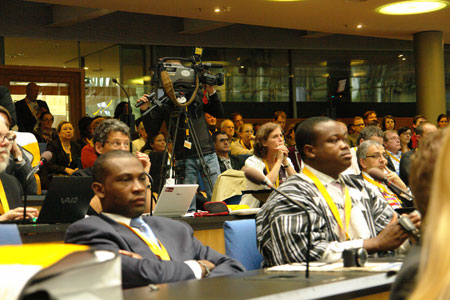
Ever since the earliest of ages, the human being has been a player. The Dutch historian Johan Huizinga knew what he was writing when he entitled his 1938 book “Homo Ludens“.
Huizinga defines the conceptual space in which play occurs. And some of the serious games today create the virtual universe in which conflicts occur.
There is nothing you cannot make a game about. What is a game, after all? To create a game, you just need a topic and a virtual universe. You then put people in it and assign them tasks.
Combining virtual experiences with the act of reporting games can be a way of representation. Take Dafur is Dying as an example. And yes, Darfur is a special case because coverage is there, but we do not know why so very little has happened.
When it comes to serious conflict gaming, a big question remains open: How do we deal with the exposure offered by such interactive games?
But for now, let’s go back to the product. Here a few other examples of games. Serious games. Food Force is a game in which a major crisis has developed in the Indian Ocean, on the island of Sheylan. A team is being sent in to step up the World Food Programme’s presence there and help feed millions of hungry people.
Against All Odds creates an environment in which you are living in great danger and must flee your country. The question is: Will you survive?
Stop Disasters is a disaster simulation game from the UN International Strategy for Disaster Reduction, an organization overseeing the development of disaster reduction policy.
A World Without Oil – yet another collaborative tool, imagining of the 32 weeks of global oil crisis.
Or, to play the bad guys and learn more, you can try Oligarchy and do what the rich big oil companies do: “lie, steal, cheat, bribe politicians, bribe scientists to give false reports and ignore Greenpeace.”
Chevron’s Energyville. Piano music in the background. The beginning of a movie in which all ends up as you want to, the game’s message being that it depends on you whether you provide enough power to meet the energy demands of your city – or not.
These are just a few examples. Serious games are out there and are being used. By schools, museums or – very much so – by the military. Journalists however do not seem to be playing such games – yet.
But here is one tool that would very much be suitable for journalists: Palestine. A game developed by Simon Egenfeldt-Nielsen, CEO of Serious Games Interactive in Copenhagen, Denmark.
This game’s task can be explained in a simple way. You are a journalist in Palestine and your task is to write a story about, let’s say, check points. You can choose your perspective: it’s the Israeli, the Palestinian, or the outside (call it “neutral” perspective). Your mission: find informants, gain their trust and get their story. Your goal is to put a story together into an article, the result being its appearance into a newspaper.
There are many educational layers to this game. And this is where I would say that games could be relabeled “the fun side of e-learning.” For Palestine, real people’s accounts and real pictures were used to create the environment. There is reference to human rights, terrorism and media. You learn how to compile a good quality journalistic article and, at the same time, write from different perspectives.
Yes, it can be a very frustrating experience when it comes to Palestine. Simon Egenfeldt-Nielsen agrees on this point. But, as he points out, the Palestine game offers the experience of what is going on. The purpose of the game is to make the player understand the atmosphere of daily experiences in the Palestinian territories.
The Palestine game is only one of the Global Conflicts game series. Another example would be Latin America: You arrive in Mexico at the US border with a bag full of journalistic ambitions. But, as you know, Latin America is one of the most turbulent, violent and poverty-stricken places on the planet.
Such games are there to inform and reinforce a dialogue. They are there for young people that would otherwise not get such information from other sources. Simon admits: When games actually work, they are less fun. But still, they are a powerful tool.
The Palestine game was created to inform a western public, mostly in schools. But the game will possibly be distributed by the Peres Center for Peace in the Middle East as well. As for the Latin America game, it will be soon translated into Spanish and Portuguese.

